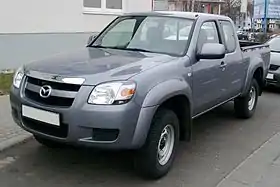Mazda BT-50
The Mazda BT-50 is a compact/mid-size pickup truck produced by the Japanese manufacturer Mazda since 2006. It is a larger version of the predecessor B-Series pickup and is not sold in the Japanese and North American markets. The second-generation Ranger has been designed by Ford Australia, with a Mazda derivative sold as the BT-50. The third-generation BT-50 was revealed in 2020, now based on the Isuzu D-Max.
| Mazda BT-50 | |
|---|---|
_front_view.jpg.webp) | |
| Overview | |
| Manufacturer | Mazda |
| Production | 2006–present |
| Body and chassis | |
| Class | Mid-size pickup truck |
| Layout | Front-engine, rear-wheel drive or four-wheel drive |
| Chronology | |
| Predecessor | Mazda B series |
First generation (J97M; 2006)
| First generation (UN) | |
|---|---|
 | |
| Overview | |
| Production | 2006–2011[1][2] |
| Assembly | Thailand: Rayong (AAT)[3] Colombia: Bogota (CCA) Zimbabwe: Willowvale (Willowvale Motor Industries) South Africa: Silverton, Pretoria (Ford South Africa) |
| Body and chassis | |
| Body style | 2-door single cab 2-door extended cab 4-door double cab |
| Related | Ford Ranger (PJ/PK) Ford Everest (first generation) |
| Powertrain | |
| Engine | 2.5 L MZR-CD I4 (turbo-diesel) 3.0 L MZR-CD I4 (turbo-diesel) |
| Transmission | 5-speed manual 5-speed automatic |
| Dimensions | |
| Wheelbase | 2,985 mm (117.5 in) (double cab) |
| Length | 5,170 mm (203.5 in) (double cab) |
| Width | 1,804 mm (71.0 in) (double cab) |
| Height | 1,762 mm (69.4 in) (double cab) |
| Curb weight | 1,763–1,878 kg (3,887–4,140 lb) |

The BT-50 was launched at the Bangkok International Motor Show on 22 March 2006. It shares its Duratorq/MZR-CD 2.5- and 3.0-liter diesel inline-four engines with the Ranger. In late November 2006, the new five-speed automatic transmission with Borg Warner transfer case has been added, as well as side airbags.
The BT-50 received a minor redesign in the first quarter of 2008, with a revised interior and several optional items made standard.
The model sold in Mexico and Central and South America includes these options:
- A 2.6-liter straight-4 4x4 only, same engine and transmission used in the previous Mazda B2600
- A 2.2-liter straight-4 4x2 only, entry-level model same as the old B2200
- A 2.5-liter diesel straight-4 either 4x2 or 4x4
Production
European and Thai models of the Ford Ranger and Mazda BT-50 are built in Thailand. South African Ford Ranger and Mazda BT-50 models are built in Pretoria, South Africa. Latin American Mazda BT-50s are built in Colombia, replaced by the Ford Ranger T6 built in Argentina since 2012. Mazda BT-50 was also assembled by the Willowvale Mazda Motor Industries in Zimbabwe from 2007 to 2010 and the most significant BT-50 assembled was the one on a 2.2litre F2 petrol engine.
The Mazda BT-50 is neither sold nor built in Japan.
Second generation (UP, UR; 2011)
| Second generation (UP, UR) | |
|---|---|
_XTR_4WD_4-door_utility_(2015-07-24)_01.jpg.webp) 2014 Mazda BT-50 SDX (pre-facelift) | |
| Overview | |
| Production | 2011–2020 |
| Assembly |
|
| Designer | Ryo Yanagisawa[4] |
| Body and chassis | |
| Class | Mid-size pickup truck |
| Body style |
|
| Platform | Ford T6 platform |
| Related | Ford Ranger (P375) |
| Powertrain | |
| Engine | |
| Transmission | 6-speed manual 6-speed automatic |
| Dimensions | |
| Wheelbase | 3,226 mm (127.0 in) |
| Length | 5,359 mm (211.0 in) |
| Width | 1,849 mm (72.8 in) |
| Height | 1,741 mm (68.5 in) (single cab) 1,837 mm (72.3 in) (double cab) 1,856 mm (73.1 in) (freestyle cab) |
| Kerb weight | 1,708–2,051 kg (3,765–4,522 lb)[5] |
A full model change of the Mazda BT-50 was revealed in October 2010 at the Australian International Motor Show.[6][7] It is based on the Ford Ranger (T6).
While the BT-50 version was designed by a Mazda team based at Ford Australia's design center in Melbourne, both Ford and Mazda worked independently. Of the exterior panels, only the windscreen, roof, and rear screen are common between the Ranger and BT-50, although the underpinnings are largely the same.[8]
_XTR_4WD_4-door_utility_(2015-07-24)_02.jpg.webp) Mazda BT-50 XTR (pre-facelift)
Mazda BT-50 XTR (pre-facelift)_XT_Hi-Rider_4x2_Freestyle_cab_chassis_(2012-10-26)_02.jpg.webp) Interior
Interior
Facelift
A revised BT-50 for the 2016 model year debuted in July 2015 and launched into the Australian market in September 2015. The UR series facelift is mainly cosmetic without any changes in engine specifications, however, several equipment changes and slight price differences over the pre-facelift model are present.[9] Another facelift for the second generation BT-50 was launched for the Australian market in 2018. Changes includes revised looks and Apple CarPlay and Android Auto support through an Alpine sound head unit.[10]
_(2).jpg.webp) Mazda BT-50 SDX (facelift)
Mazda BT-50 SDX (facelift)_(cropped).jpg.webp) Mazda BT-50 4x4 (facelift)
Mazda BT-50 4x4 (facelift)
Pangolin Edition
In November 2020, Mazda Philippines launched the BT-50 4x4 Pangolin Edition to raise awareness of the endangered pangolin. This variant featured a matte black grille, aluminum roof rack, roll bars, riveted fender flares, 17-inch Rota alloy wheels, and a white pangolin decal on each side.[11][12]
Third generation (TF; 2020)
| Third generation (TF) | |
|---|---|
 Mazda BT-50 Hi-Racer Double-Cab (Thailand) | |
| Overview | |
| Production | 2020–present |
| Assembly |
|
| Designer | Eiji Kimoto[13] |
| Body and chassis | |
| Body style |
|
| Related | Isuzu D-Max |
| Powertrain | |
| Engine |
|
| Transmission |
|
| Dimensions | |
| Wheelbase | 3,125 mm (123.0 in) |
| Length |
|
| Width | 1,810–1,870 mm (71.3–73.6 in) |
| Height | 1,690–1,790 mm (66.5–70.5 in) |
.jpg.webp)
.jpg.webp)
The third generation BT-50 was unveiled in Australia on 17 June 2020.[14] Unlike its predecessors, the BT-50 was developed from the third generation Isuzu D-Max. The pickup is a result of a tie-up between Mazda and Isuzu which was announced on 11 July 2016, with Isuzu agreeing to supply pickup trucks to Mazda.[15] An Isuzu executive told Australian media CarsGuide that Mazda had no involvement in the development of the D-Max, and that Mazda will be handed a finished pick-up truck instead.[16] As the result, the TF BT-50 is built at Isuzu Motors plant in Samrong, Samut Prakan, Thailand.
The vehicle features the Mazda's Kodo design language similar to its crossover line-up. While it still shares the base structure, body shell and the wing mirrors with the Isuzu D-Max, Mazda made most of the body panels unique. It is powered by the Isuzu-sourced 3.0-litre 4JJ3-TCX inline-four turbo-diesel engine, replacing the 3.2-litre MZ-CD inline-five Ford Duratorq turbodiesel engine.[17]
For the first time, the third generation BT-50 is available with adaptive cruise control which is aided by twin cameras in the windscreen rather than a radar sensor in the grille, as to make the installation of off-road accessories in the front of the vehicle possible. Autonomous emergency braking, blind zone warning, rear cross-traffic alert, lane-keeping assistance and centre airbags are also available in select trims.[18]
Thailand
The model was released in Thailand on 21 January 2021. It features a smaller 1.9-litre engine.[19]
Philippines
In the Philippines, the third generation BT-50 was released on 17 November 2021. It comes in two trims: 4x2 Standard (6-speed manual and automatic) and 4x4 Premium (automatic only). All variants are powered with the 3.0-litre 4JJ3-TCX engine.[20][21]
Malaysia
In Malaysia, the third generation BT-50 was launched on 30 November 2021. It comes in four trims: 1.9 Single Cab 4x4 (manual only), 1.9 Mid 4x4 (manual and automatic), 1.9 High 4x4 (automatic only) and 3.0 High Plus 4x4 (automatic only).[22]
Sales
| Calendar Year | Thailand | Australia |
|---|---|---|
| 2014 | 12,931[23] | |
| 2015 | 8,054[24] | |
| 2016 | 7,052[25] | |
| 2017 | 5,939[26] | |
| 2018 | 7,498[27] | |
| 2019 | 5,664[28] | |
| 2020 | 2,711[29] | |
| 2021 | 1,441[30] | 15,662[31] |
References
- "New Ranger Ford Van Review | Van Reviews". Parkers. Archived from the original on 9 September 2011. Retrieved 22 October 2011.
- "Ford Ranger - the powerful & reliable pick-up truck from Ford". Ford. Archived from the original on 25 June 2014. Retrieved 22 October 2011.
- "(Thailand) Co., Ltd". AutoAlliance. Archived from the original on 17 June 2011. Retrieved 17 July 2010.
- Campbell, Matt (22 January 2015). "Mazda BT-50 update to be heavily influenced by Australian feedback". Car Advice. Retrieved 23 January 2015.
- "Archived copy". mazda.co.id. Archived from the original on 31 December 2014. Retrieved 14 January 2015.
{{cite web}}: CS1 maint: archived copy as title (link) - "New Mazda BT-50 (Fighter) to debut in Australia". Retrieved 13 September 2010.
- Davis, Brett (13 September 2010). "Mazda BT-50 to debut at Sydney Motor Show". Caradvice.com.au. Retrieved 16 October 2010.
- Stanford, James (18 October 2011). "First drive: Mazda Australia aims for BT-50 leadership". GoAuto.com.au. Retrieved 15 March 2021.
- "หลุด Mazda BT-50 Pro Minor Change เมืองไทยเจอกันแน่ๆ เดือนกรกฎาคม?" (in Thai). Cars New Update. 26 May 2015. Retrieved 11 July 2015.
- "Mazda BT-50 gets second facelift in Australia – Apple CarPlay and Android Auto as standard, from RM86k". Paul Tan's Automotive News. 3 May 2018. Retrieved 28 November 2018.
- "Mazda Philippines Champions Wildlife Preservation with the BT-50 4×4 Pangolin". Mazda Philippines. 27 November 2020. Retrieved 15 March 2021.
- Peregrino, Randy S. (15 January 2021). "Mazda introduces the BT-50 4×4 Pangolin Edition". BusinessMirror. Retrieved 15 March 2021.
- "Brand-New BT-50 Global Reveal - YouTube". YouTube.
- "2021 Mazda BT-50 unveiled, in showrooms this year | CarAdvice". CarAdvice.com. Retrieved 17 June 2020.
- "ภาพ Official : All NEW Mazda BT-50 แชร์พื้นฐานร่วมกับ Isuzu D-max". HeadLight Magazine (in Thai). 17 June 2020. Retrieved 17 June 2020.
- "Next-gen Mazda BT-50 to get completed Isuzu D-Max as base, but promises more masculine Kodo design - paultan.org". Paul Tan's Automotive News. 9 January 2020. Retrieved 12 February 2021.
- "2020 Mazda BT-50: Detailed walkaround". CarExpert.com.au. 17 June 2020. Retrieved 17 June 2020.
- "2021 Isuzu D-Max, Mazda BT-50: first utes with centre airbags | CarAdvice". CarAdvice.com. Retrieved 17 June 2020.
- "ราคาอย่างเป็นทางการ All NEW Mazda BT-50 Double Cab (ดีเซล 1.9 / 3.0) : 771,000 - 1,153,000 บาท" [Official Price All NEW Mazda BT-50 Double Cab (Diesel 1.9 / 3.0): 771,000 - 1,153,000 Baht.]. HeadLight Magazine (in Thai). 21 January 2021. Retrieved 23 January 2021.
- "Mazda Unveils All-New 2022 BT-50 With Standard 3.0-Liter Engine, 5 Years Free Service (w/ Specs)". CarGuide.PH. 17 November 2021.
- "Mazda launches 2022 BT-50, prices start at PHP 1.390M". AutoIndustriya.com. Philippines. 17 November 2021.
- "2022 Mazda BT-50 launched in Malaysia – five CBU variants; 1.9L, 3.0L engines; AEB, ACC; fr RM124k". Malaysia: Paul Tan's Automotive News. 30 November 2021.
- "Thailand cars sales report 2014". HeadlightMag.com. Thailand. February 2015. Retrieved 24 October 2018.
- "Thailand cars sales report 2015". HeadlightMag.com. Thailand. 10 June 2016. Retrieved 24 October 2018.
- "Thailand cars sales report 2016". HeadlightMag.com. Thailand. 26 January 2017. Retrieved 24 October 2018.
- "Thailand cars sales report 2017". HeadlightMag.com. Thailand. 29 January 2018. Retrieved 24 October 2018.
- "Thailand cars sales report 2018". HeadlightMag.com. Thailand. Retrieved 24 October 2018.
- "Thailand pick-up sales report 2019". HeadlightMag.com (in Thai). Thailand. 25 February 2020. Retrieved 25 February 2020.
- "Thailand pick-up sales report 2020". HeadlightMag.com (in Thai). Thailand. 25 January 2021. Retrieved 26 January 2021.
- "จำนวนรถกระบะไทยปี 2021 เผยยอดจดทะเบียนใหม่แยกรุ่น Isuzu D-Max ครองแชมป์ Revo ตามห่าง | AutoFun". AutoFun Thailand (in Thai). 17 January 2022. Retrieved 18 January 2022.
- Costello, Mike (6 January 2022). "VFACTS: Australia's 2021 new car sales detailed in full". CarExpert.